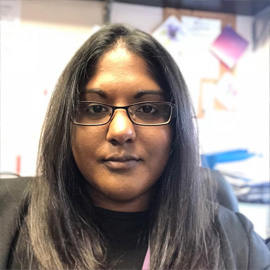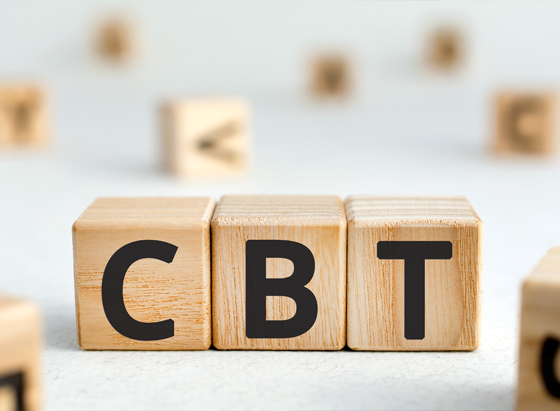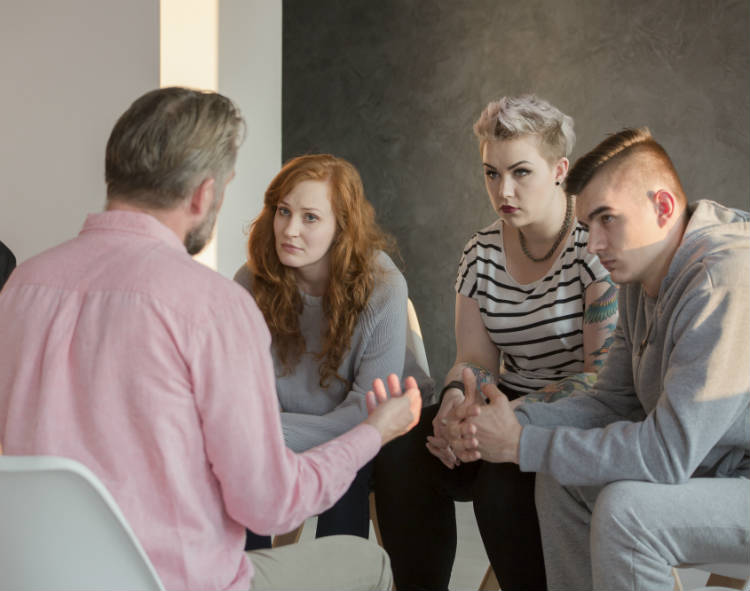Psychotherapy

Written by:
Last Updated:
June 20th, 2025

Psychotherapy for the Treatment of Addictions
Psychotherapy is an umbrella term for the array of treatments that you can utilise in order to overcome issues that affect your mental health and behaviour; these are often some of the causes and contributors for developing an addiction. By developing a heightened awareness of your thoughts and feelings, you can use this to understand how emotions and actions contribute to addictive behaviour. The focus of psychotherapy is to help you better understand your feelings and the reasons for acting in a particular way. In this way, it becomes easier for you to bring about positive changes. (1)
Importance of Psychotherapy in Addiction Treatment
Psychotherapy can take place one-to-one or in a group setting, depending on what you need for feeling better and healing. At Sanctuary Lodge, we also encourage you to take part in family therapy. During these sessions, alongside one of our experts, you and your loved ones will have a safe and supporting environment for discussing shared issues and solving previous conflicts. During group therapy, you will discover a peer group of like-minded people who are also part of the various stages of treatment at the centre.
We encourage you to open up, share and also to listen to what other people are going through; the aim is to try to help each other solve arising issues with the help of the present qualified counsellor. Many share with us that hearing the stories of other people in recovery has been a maturing and inspirational experience for them. Within these sessions, you may discover something beautiful and beneficial for yourself from the example and experience of your peers and, eventually, become a role model to others in your group. (2)
One-to-one therapy can be particularly beneficial if you’re suffering from a co-occurring disorders (addiction and mental health conditions) such as depression, PSTD or bipolar disorder. It is, however, successfully utilised also in most treatments for addiction. During treatment, you can focus on feeling better, safer and healthier. We’ve helped thousands of people overcome addiction and feel again attached to the world and in control of their lives. (3)
Types of Psychotherapy at Sanctuary Lodge
In addition to traditional therapies that have been found to have high success rates such as cognitive behavioural therapy and group therapy, we offer holistic therapies. (4) These are very hard to put into a frame, so research on the success rates, although available, are still not fully developed. Holistic therapies focus on healing your body, mind and spirit.
We create bespoke treatment plans based on your unique needs. These incorporate treatments that help you take care of yourself and to regain hope and purpose.
Cognitive behavioural therapy (CBT)
This is one of the most widely recommended types of therapy for treating a range of mental health conditions. The premise of CBT is that negative behaviour such as addiction and depression is amplified by dysfunctional and deeply ingrained patterns of thinking.
Have you caught yourself subconsciously affecting your decisions and the way you choose to live? It’s attending such therapies is instrumental in becoming aware of the existence of such behaviours.
Those patterns of thinking can prevent you from believing you’re capable of making a full recovery and undermine your recovery efforts. As you work with our qualified CBT specialists, you can discover safe ways to counter negative emotions as well as useful methods for staying aware. At the end of CBT therapy, you will feel empowered to develop new ways of responding to stress and ready to resume a fulfilled, happy life. (5)
Dialectical behavioural therapy (DBT)
We are proud to offer this highly structured method of therapy that has been proven to be effective at helping people who have repeatedly relapsed. DBT was developed in the late 1980s to treat recurring suicidal thoughts in individuals who have borderline personality disorder. Three key elements make DBT stand out from other cognitive therapies.
- 1. Collaboration: During DBT sessions, there is no observer and no speaker; these roles are entirely replaced by a common task – discussing and finding solutions together. Both you and the DBT specialist work towards a shared understanding of how and why problem thinking arises and find solutions through collaboration.
- 2. Conflict resolution: Learning that some conflict can’t be resolved is a big part of DBT. While we can’t change some negative aspects of life, we can find ways of coping with or overcoming them.
- 3. Support: One of the best things about DBT is how empowering it can be! A therapist will work with you to identify your strengths.
- Those strengths will become the focus of how you’ll learn to cope with your feelings. Every individual success is celebrated, and you will feel supported and understood during every step of the process. (6)
Group Therapy
Group therapy goes hand in hand with addiction treatment, and these sessions give you a unique opportunity to tell your story and hear the plights of your peers. Being part of a group has a naturally beneficial effect on us as human beings. Speaking openly and hearing what your group is going through is an effective therapy for depression, shame and anxiety.
Under the supervision of a trained counsellor, you may learn how to deal with an issue you have in confiding to a loved one or colleague about your problems. In such an environment, conflict is unlikely, and this provides a safe space for all the good intentions to shine. You may learn a lot about behaviour just from observing those around you.
Groups can help you to develop in ways that are creative and healthy, providing you with positive encouragement in times of pain and trouble. (2)
Who Will be Providing Psychotherapy Sessions?
Psychotherapy sessions at Sanctuary Lodge involve an addiction counsellor. We have BACP-registered specialists working alongside you towards your recovery. Most CBT and DBT sessions are led by an addiction counsellor and are a mixture of one-to-one and group sessions. Hearing other people’s stories can have a profound effect and drive the group to get better collectively.
The 12-step model uses psychotherapy elements for helping you heal and feel better both emotionally and mentally; the focus is usually on peer-led support and discussions, as opposed to individual counselling. An addiction counsellor is present during these meetings, but the objective of this type of psychotherapy is that you and your group encourage each other to maintain sobriety.
Your care doesn’t end as you walk out of the door. Recovery is an ongoing process. This is why we provide free aftercare.
Disclaimer:
The availability of therapies may vary across UKAT centres. The specific therapies provided will be determined based on your treatment plan and the programme offered at your chosen facility. All treatments are subject to clinical assessment and programme availability at the time of admission. For further details on the therapies included in your treatment plan, please contact our admissions team.







